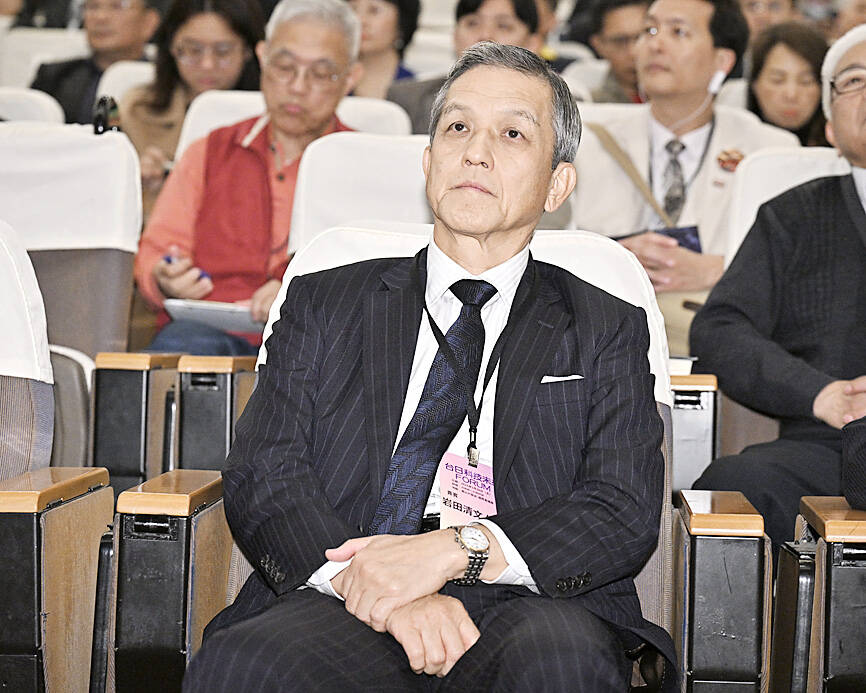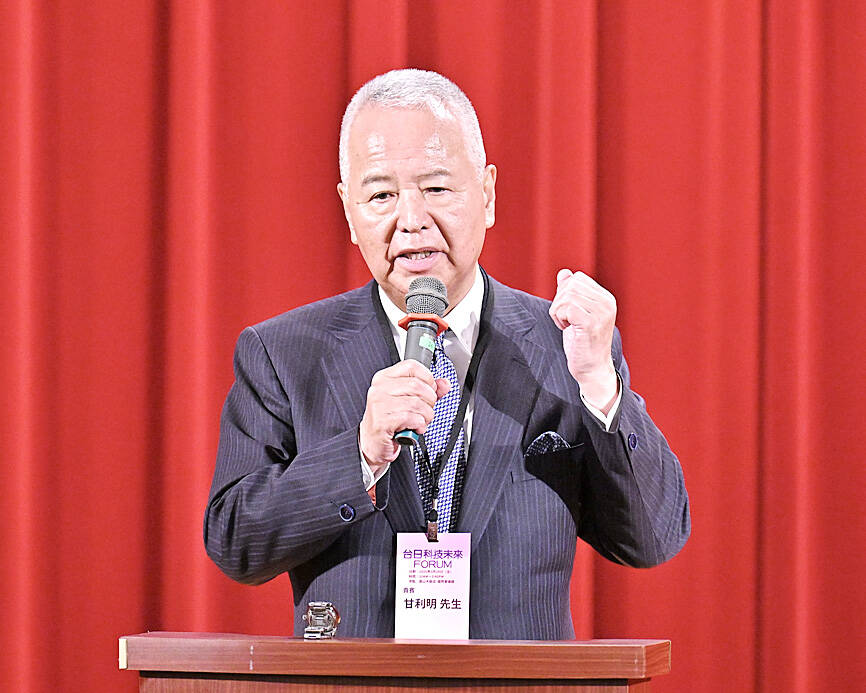Japan’s former top army commander yesterday expressed hope that Taiwan would form a “semiconductor alliance” with Japan.
“Taiwan and Japan share a destiny,” retired general Kiyofumi Iwata, a former chief of staff of the Japan Ground Self-Defense Force, told a conference in Taipei on semiconductors and geopolitics hosted by the Indo-Pacific Strategic Thinktank after reiterating former Japanese prime minister Shinzo Abe’s aphorism that “a Taiwan contingency is a Japan contingency.”
The Russian invasion of Ukraine has shown the important role chips play in modern warfare, Iwata said.

Photo: Tu Chien-jung, Taipei Times
Semiconductors are the key component in a vast array of weapons ranging from High Mobility Artillery Rocket Systems, Javelin anti-tank guided missiles, uncrewed aerial vehicles and telecommunications satellites, he said.
Chips used in military equipment are comparatively large wafers ranging from 45-nanometers to 250-nanometers, Iwata said.
Despite Western and Japanese embargoes, Moscow has sourced military-grade semiconductors from China, with Chinese chips accounting for 89 percent of all semiconductor imports in Russia, he said.

Photo: Tu Chien-jung, Taipei Times
Artificial intelligence (AI) and chips are expected to have an even larger impact, as militaries are already adopting drones for land, sea and air warfare, he said.
The performance goals of the US Air Force Collaborative Combat Aircraft program suggests that a few soldiers would soon be able to direct hundreds of combat drones at a time, he said.
Beijing’s policy is to build the Chinese People’s Liberation Army (PLA) into a force capable of invading Taiwan, he said, adding that the PLA leadership has shown an appreciation for the military potential of chips and AI.
Taiwan, Japan and the US must develop a joint network of semiconductor supply chains to ensure they retain the capability to deter the PLA and defeat it if necessary, Iwata said.
Japanese would no more allow Taiwan to fall into Chinese hands than Taiwanese themselves, he said in a call for greater cooperation in technology between the two nations.
Former Japanese minister of economy, trade and industry Akira Amari told the conference that Chinese-developed AI program DeepSeek poses a security threat to the nations of its users and is part of Beijing’s bid to replace global digital infrastructure.
Out of the global race to develop generative AI, DeepSeek is the first to turn a profit, largely thanks to low costs and giving users ownership over content they create, Amari said.
China’s aim is to make the world dependent on DeepSeek as infrastructure, granting Beijing access to data on a global scale, he said, adding that China owns 100 percent of input to the program.
DeepSeek users who work for commercial entities or research groups are feeding their intellectual property to a Chinese-owned database, allowing Beijing to know of or predict technological developments, he said.
China would effectively possess knowledge that enables it to take away any government’s autonomy and ability to make decisions independently, Amari said.
Japan is not a competitor, but a partner in Taiwan’s efforts to create free and secure global chip supply chains, he said.
Society is undergoing a systemic digital transformation in which all activities are driven by data, he said, adding that semiconductors undergird the functioning of nations and economies.
By any measure, Taiwan Semiconductor Manufacturing Co (TSMC) is the world’s sole supplier of advanced chips unrivalled by Intel or Samsung, an achievement Taiwan is rightfully proud of, he said.
Eighty percent of TSMC’s revenue is accounted for by a handful of companies, including Nvidia, which controls semiconductor design, Amari said.
With an ever-growing number of companies trying to enter the chip design sector, TSMC’s original equipment manufacturing capacity would not suffice to meet demand, he said.
Japan’s creation of Rapidus is meant to fill this gap and would not be a direct competitor to TSMC, given the latter’s increasing specialization on customization and end-of-line packaging, he said.
Working hand-in-hand, Rapidus and TSMC could stabilize the world’s chip supply, and ensure free and democratic societies continue their digital transformations, he said.
Hundreds of companies and thousands of manufacturing steps go into making the most advanced chips, he added.
The US, Japan and the Netherlands source 80 percent of the world’s chipmaking equipment, Japan sources 55 percent of the materials and Taiwan makes 94 percent of the final product, Amari said.
The notion that one country can produce top-of-the-line chips on its own is a fantasy, but explaining this to US President Donald Trump might be the biggest challenge to the industry, he added.

The Ministry of Economic Affairs has fined Taobao NT$1.2 million (US$36,912) for advertisements that exceed its approved business scope, requiring the Chinese e-commerce platform to make corrections in the first half of this year or its license may be revoked. Lawmakers have called for stricter enforcement of Chinese e-commerce platforms and measures to prevent China from laundering its goods through Taiwan in response to US President Donald Trump’s heavy tariffs on China. The Legislative Yuan’s Finance Committee met today to discuss policies to prevent China from dumping goods in Taiwan, inviting government agencies to report. Democratic Progressive Party Legislator Kuo Kuo-wen (郭國文) said

The Ministry of Economic Affairs has fined Taobao NT$1.2 million (US$36,900) for advertisements that exceeded its approved business scope and ordered the Chinese e-commerce platform to make corrections in the first half of this year or its license would be revoked. Lawmakers have called for stricter supervision of Chinese e-commerce platforms and more stringent measures to prevent China from laundering its goods through Taiwan as US President Donald Trump’s administration cracks down on origin laundering. The legislature’s Finance Committee yesterday met to discuss policies to prevent China from dumping goods in Taiwan, inviting government agencies to report on the matter. Democratic Progressive Party

Taiwan and its Pacific ally Tuvalu on Tuesday signed two accords aimed at facilitating bilateral cooperation on labor affairs, according to Taiwan’s Ministry of Foreign Affairs (MOFA). The governments inked two agreements in Taipei, witnessed by Foreign Minister Lin Chia-lung (林佳龍) and visiting Deputy Tuvaluan Prime Minister Panapasi Nelesone, MOFA said in a news release. According to MOFA, the agreements will facilitate cooperation on labor issues and allow the two sides to mutually recognize seafarers’ certificates and related training. Taiwan would also continue to collaborate with Tuvalu across various fields to promote economic prosperity as well as the well-being of their

Sung Chien-liang (宋建樑), who led efforts to recall Democratic Progressive Party (DPP) Legislator Lee Kun-cheng (李坤城), was released on bail of NT$80,000 today amid outcry over his decision to wear a Nazi armband to questioning the night before. Sung arrived at the New Taipei District Prosecutors’ Office for questioning in a recall petition forgery case last night wearing a red armband bearing a swastika, carrying a copy of Adolf Hitler’s Mein Kampf and giving a Nazi salute. Sung left the building at 1:15am without the armband and covering the book with his coat. Lee said today that this is a serious